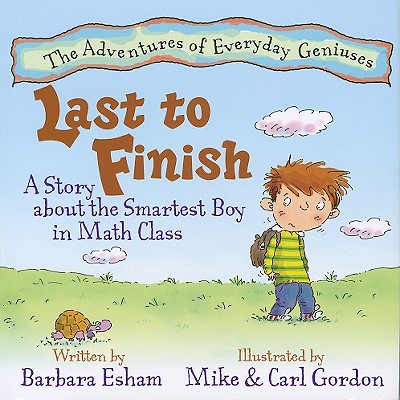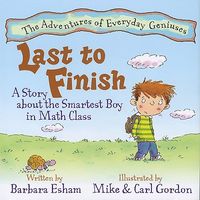- Welcome to FictionDB, Guest
- | My Account
- | Help

Last to Finish: A Story about the Smartest Boy in Math Class — Barbara H. Esham

-
Published:
Jun-2008 (Hardcover) -
Formats:
Print -
Series:
-
Main Genre:
General Fiction -
Pages:
29 -
Age Level:
06-08 -
Rating:
-
Purchase:
-
Share:
Review:
"The second picture book in The Adventures of Everyday Geniuses series features Max, a third-grader who had always liked math until his teacher started using a timer for testing the class on multiplication facts. Max clutches when he tries to hurry. When his missing math folder reveals that Max has been working problems from the older brother s algebra book for fun, he is invited to join the school math team as well as a program for accelerated math students. Tinted with colorful washes, ink drawings illustrate the story with sympathy and humor. One particularly expressive picture illustrates the phrase my mind freezes with a drawing of unhappy Max seated at his school desk, his head turned into a snowman s noggin, carrot nose and all. The well-phrased text also reassures children that understanding is more important than memorization and that a strength in one area of learning can offset a weakness in another."
Carolyn Phelan
American Library Association, BOOKLIST
Endorsements:
I applaud Barbara Esham for finding a way to teach young children how to be more mindful. In so doing, she sets the stage for their greater well-being as adults.
Dr. Ellen Langer, Harvard University
Professor of Psychology
Over the years I have witnessed great advances in our
understanding of learning styles. Yet I have been struck with how little progress we have made in translating this research into words and practices that students and their parents can use. The books of the Mainstream Connections series are honest but positive, helpful without preaching, and they are readable but not too simplistic. I have no doubt these books will touch the hearts and minds of many, and help some lost children find good in
themselves.
Dr. Jeffrey Gilger, Purdue University
College of Education
Each book in the Mainstream Connections Children's Book Series offers a reassuring message for children and sage advice for their adult caregivers, who do not always appreciate children's naive construals of their peers, teachers, and schools. The books encourage children not to shy away from obstacles by showing how many adults--from Mom and Dad to intellectual
giants--overcame similar obstacles on the road to success. They dispel misconceptions about intelligence that can undermine confidence among children who do not immediately succeed in school. They also highlight the pitfalls of measuring oneself in comparison to peers. Although the books seem targeted toward
children who struggle, there are important messages for those children for whom school seems to come easy as well as the teachers and parents who create the environments in which children learn. A recurring theme is the importance to children of understanding and affirmation from adults. The richness and depth of these books, which are firmly rooted in behavioral
science research, is uncommon in short stories for children.
It is quite possible that these books will rescue some children from the uncertainty, anxiety, and struggle that school and peer relations sometimes create.
Dr. Rick Hoyle, Duke University
Research Professor Psychology & Neuroscience
"Surprisingly, many of history's greatest mathematicians have been slow--or even spotty--calculators. Kudos to Barb Esham for this wise and witty reminder of the difference between rote memorization and higher math reasoning. Last to Finish is the perfect book for the child whose passion for exploring the magical world of mathematics is in danger of
"The second picture book in The Adventures of Everyday Geniuses series features Max, a third-grader who had always liked math until his teacher started using a timer for testing the class on multiplication facts. Max clutches when he tries to hurry. When his missing math folder reveals that Max has been working problems from the older brother s algebra book for fun, he is invited to join the school math team as well as a program for accelerated math students. Tinted with colorful washes, ink drawings illustrate the story with sympathy and humor. One particularly expressive picture illustrates the phrase my mind freezes with a drawing of unhappy Max seated at his school desk, his head turned into a snowman s noggin, carrot nose and all. The well-phrased text also reassures children that understanding is more important than memorization and that a strength in one area of learning can offset a weakness in another."
Carolyn Phelan
American Library Association, BOOKLIST
Endorsements:
I applaud Barbara Esham for finding a way to teach young children how to be more mindful. In so doing, she sets the stage for their greater well-being as adults.
Dr. Ellen Langer, Harvard University
Professor of Psychology
Over the years I have witnessed great advances in our
understanding of learning styles. Yet I have been struck with how little progress we have made in translating this research into words and practices that students and their parents can use. The books of the Mainstream Connections series are honest but positive, helpful without preaching, and they are readable but not too simplistic. I have no doubt these books will touch the hearts and minds of many, and help some lost children find good in
themselves.
Dr. Jeffrey Gilger, Purdue University
College of Education
Each book in the Mainstream Connections Children's Book Series offers a reassuring message for children and sage advice for their adult caregivers, who do not always appreciate children's naive construals of their peers, teachers, and schools. The books encourage children not to shy away from obstacles by showing how many adults--from Mom and Dad to intellectual
giants--overcame similar obstacles on the road to success. They dispel misconceptions about intelligence that can undermine confidence among children who do not immediately succeed in school. They also highlight the pitfalls of measuring oneself in comparison to peers. Although the books seem targeted toward
children who struggle, there are important messages for those children for whom school seems to come easy as well as the teachers and parents who create the environments in which children learn. A recurring theme is the importance to children of understanding and affirmation from adults. The richness and depth of these books, which are firmly rooted in behavioral
science research, is uncommon in short stories for children.
It is quite possible that these books will rescue some children from the uncertainty, anxiety, and struggle that school and peer relations sometimes create.
Dr. Rick Hoyle, Duke University
Research Professor Psychology & Neuroscience
"Surprisingly, many of history's greatest mathematicians have been slow--or even spotty--calculators. Kudos to Barb Esham for this wise and witty reminder of the difference between rote memorization and higher math reasoning. Last to Finish is the perfect book for the child whose passion for exploring the magical world of mathematics is in danger of
Age Level
Genres
Click on any of the links above to see more books like this one.
